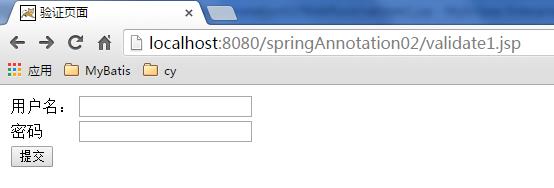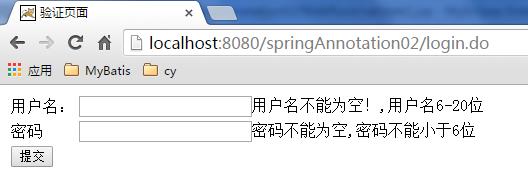Spring MVC 之输入验证
Posted
tags:
篇首语:本文由小常识网(cha138.com)小编为大家整理,主要介绍了Spring MVC 之输入验证相关的知识,希望对你有一定的参考价值。
Spring MVC 验证主要还是用的是hibernate的验证。so需要添加以下的jar包:
1、 hibernate-validator-5.2.2.Final.jar
2、hibernate-validator-annotation-processor-5.2.2.Final.jar (这个可以不用)
3、 log4j.jar
4 、slf4j-api-1.5.6.jar
5、 slf4j-log4j12-1.5.6.jar
6 、validation-api-1.1.0.Final.jar
以登录验证为例:
在实体属性上配置注解;
package com.cy.springannotation.entity; import javax.validation.constraints.NotNull; import javax.validation.constraints.Pattern; import org.hibernate.validator.constraints.Length; import org.hibernate.validator.constraints.NotEmpty; /** * 定义一个表单实体类 * @author acer * */ public class UserBean { //要求属性名必须要和表单的参数名一样的! @NotEmpty(message="用户名不能为空!") @Pattern(regexp="\\w{6,20}",message="用户名6-20位") private String username; @NotEmpty(message="密码不能为空") @Length(max=20,min=6,message="密码不能小于6位") private String password; public String getUsername() { return username; } public void setUsername(String username) { this.username = username; } public String getPassword() { return password; } public void setPassword(String password) { this.password = password; } }
JSP页面上通过spring标记来获取错误信息:
1 <%@ page language="java" import="java.util.*" pageEncoding="utf-8" contentType="text/html; charset=utf-8"%> 2 <% 3 String path = request.getContextPath(); 4 String basePath = request.getScheme()+"://"+request.getServerName()+":"+request.getServerPort()+path+"/"; 5 %> 6 <!-- srpingmvc 验证需要使用到spring表单标签 --> 7 <%@ taglib prefix="springform" uri="http://www.springframework.org/tags/form" %> 8 <!DOCTYPE HTML PUBLIC "-//W3C//DTD HTML 4.01 Transitional//EN"> 9 <html> 10 <head> 11 <base href="<%=basePath%>"> 12 13 <title>验证页面</title> 14 15 <meta http-equiv="pragma" content="no-cache"> 16 <meta http-equiv="cache-control" content="no-cache"> 17 <meta http-equiv="expires" content="0"> 18 <meta http-equiv="keywords" content="keyword1,keyword2,keyword3"> 19 <meta http-equiv="description" content="This is my page"> 20 <!-- 21 <link rel="stylesheet" type="text/css" href="styles.css"> 22 --> 23 24 </head> 25 26 <body> 27 28 <!-- commandName用于指定活动的Bean对象,即我可以在页面上,获取对象属性所对应的错误信息,值是对象名称的首字母小写,同modelAttribute一样的意思(modelAttribute="contentModel") --> 29 <!-- <springform:form method="post" action="login.do" commandName="userBean"> --> 30 <springform:form method="post" action="login.do" modelAttribute="user"> 31 32 <table> 33 <tr> 34 <td>用户名:</td> 35 <td><input type="text" name="username"/><springform:errors delimiter="," path="username"></springform:errors></td> 36 </tr> 37 <tr> 38 <td>密码</td> 39 <td><input type="text" name="password"/><springform:errors delimiter="," path="password"></springform:errors></td> 40 </tr> 41 <tr> 42 <td colspan="2"> <input type="submit" value="提交"/> </td> 43 </tr> 44 </table> 45 </springform:form> 46 </body> 47 </html>
delimiter:如果一个属性有多个错误,错误信息的分隔符。默认是换行.
path:验证失败的属性名.
控制器:
1 @RequestMapping(value="/login.do") 2 //@Valid 通过该注解告知该方法,我的哪个实体Bean需要验证 3 //BindingResult 为固定参数,用于接收验证结果 4 5 public String login(@ModelAttribute("user") @Valid UserBean user,BindingResult br) { 6 if(br.hasErrors()){ 7 //验证未通过则 8 return "validate1"; 9 } 10 log.info(user.getUsername()); 11 log.info(user.getPassword()); 12 13 return "index"; 14 }
如果界面上使用了spring标签,那么需要预先启动Spring容器,所以在web.xml中增加配置:
1 <!-- 启动spring容器,用于支持springmvc validate --> 2 <context-param> 3 <param-name>contextConfigLocation</param-name> 4 <param-value>/WEB-INF/classes/springAnnotation-servlet.xml</param-value> 5 </context-param> 6 7 <!-- 配置在context-param里面文件内的内容,需要通过 ContextLoaderListener添加到上下文里面去--> 8 <listener> 9 <listener-class>org.springframework.web.context.ContextLoaderListener</listener-class> 10 </listener>
到springAnnotation-servlet.xml文件中配置:
1 <!-- 开启注解这里需要添加个validator--> 2 <!--开启注解 --> 3 <mvc:annotation-driven conversion-service="tc" validator="validator" /> 4 5 <!-- 验证配置,告知srpingmvc,我使用的是Hibernate验证框架来完成的验证 --> 6 <bean id="validator" class="org.springframework.validation.beanvalidation.LocalValidatorFactoryBean"> 7 <property name="providerClass" value="org.hibernate.validator.HibernateValidator" /> 8 </bean>
显示测试:
进入登录页面

直接点击提交:

下面是主要的验证注解及说明:
|
注解 |
适用的数据类型 |
说明 |
|
@AssertFalse |
Boolean, boolean |
验证注解的元素值是false |
|
@AssertTrue |
Boolean, boolean |
验证注解的元素值是true |
|
@DecimalMax(value=x) |
BigDecimal, BigInteger, String, byte,short, int, long and the respective wrappers of the primitive types. Additionally supported by HV: any sub-type of Number andCharSequence. |
验证注解的元素值小于等于@ DecimalMax指定的value值 |
|
@DecimalMin(value=x) |
BigDecimal, BigInteger, String, byte,short, int, long and the respective wrappers of the primitive types. Additionally supported by HV: any sub-type of Number andCharSequence. |
验证注解的元素值小于等于@ DecimalMin指定的value值 |
|
@Digits(integer=整数位数, fraction=小数位数) |
BigDecimal, BigInteger, String, byte,short, int, long and the respective wrappers of the primitive types. Additionally supported by HV: any sub-type of Number andCharSequence. |
验证注解的元素值的整数位数和小数位数上限 |
|
@Future |
java.util.Date, java.util.Calendar; Additionally supported by HV, if theJoda Time date/time API is on the class path: any implementations ofReadablePartial andReadableInstant. |
验证注解的元素值(日期类型)比当前时间晚 |
|
@Max(value=x) |
BigDecimal, BigInteger, byte, short,int, long and the respective wrappers of the primitive types. Additionally supported by HV: any sub-type ofCharSequence (the numeric value represented by the character sequence is evaluated), any sub-type of Number. |
验证注解的元素值小于等于@Max指定的value值 |
|
@Min(value=x) |
BigDecimal, BigInteger, byte, short,int, long and the respective wrappers of the primitive types. Additionally supported by HV: any sub-type of CharSequence (the numeric value represented by the char sequence is evaluated), any sub-type of Number. |
验证注解的元素值大于等于@Min指定的value值 |
|
@NotNull |
Any type |
验证注解的元素值不是null |
|
@Null |
Any type |
验证注解的元素值是null |
|
@Past |
java.util.Date, java.util.Calendar; Additionally supported by HV, if theJoda Time date/time API is on the class path: any implementations ofReadablePartial andReadableInstant. |
验证注解的元素值(日期类型)比当前时间早 |
|
@Pattern(regex=正则表达式, flag=) |
String. Additionally supported by HV: any sub-type of CharSequence. |
验证注解的元素值与指定的正则表达式匹配 |
|
@Size(min=最小值, max=最大值) |
String, Collection, Map and arrays. Additionally supported by HV: any sub-type of CharSequence. |
验证注解的元素值的在min和max(包含)指定区间之内,如字符长度、集合大小 |
|
@Valid |
Any non-primitive type(引用类型) |
验证关联的对象,如账户对象里有一个订单对象,指定验证订单对象 |
|
@NotEmpty |
|
验证注解的元素值不为null且不为空(字符串长度不为0、集合大小不为0) |
|
@Range(min=最小值, max=最大值) |
|
验证注解的元素值在最小值和最大值之间 |
|
@NotBlank |
|
验证注解的元素值不为空(不为null、去除首位空格后长度为0),不同于@NotEmpty,@NotBlank只应用于字符串且在比较时会去除字符串的空格 |
|
@Length(min=下限, max=上限) |
|
验证注解的元素值长度在min和max区间内 |
|
|
|
验证注解的元素值是Email,也可以通过正则表达式和flag指定自定义的email格式 |
以上是关于Spring MVC 之输入验证的主要内容,如果未能解决你的问题,请参考以下文章
多对多 Spring MVC mappedBy 引用了一个未知的目标实体属性